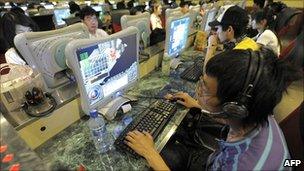Making money from Asia's expanding blogosphere
- Published
After graduating from The London School of Economics Cheo Ming Shen was inspired by the business opportunities the internet was providing in the West.
He decided to set up his own business in Asia, taking advantage of the region's undeveloped online market.
Mr Cheo describes his general business idea simply: "I look for business opportunities that I think can work in the internet space, and then I go develop it, and then market it and sell it as a business."
To date, Mr Cheo has launched four internet businesses in Singapore with his partner Timothy Tiah Ewe Tiam. Their first enterprise, Nuffnang, spotted the chance to put advertising in blank spaces on online blogs.
"In Asia, there are hundreds of thousands of blogs…it's a fad that has taken off in such a way that…the West hasn't seen," he explains.
"This was a big chunk of internet space that wasn't being monetised. It represented a huge audience collectively but nobody could… effectively put them together."
Developing opportunities
Nuffnang acts as the middleman between advertisers and bloggers, putting them in contact with each other. Bloggers are paid per unique visitor and Nuffnang takes a cut.
The concept has proved popular. Nuffnang has now expanded to Malaysia, the Philippines and Australia.
Mr Cheo believes its success is due to the intimate relationship between the blog site and the reader which standard websites find hard to replicate: "The blogs are a very interactive medium so it's a very personal medium as well… When somebody sees advertising… they're more likely to click."
Adaptation
Mr Cheo admits that his idea isn't unique and that 'big bang ideas' are hard to produce. But he says that in business "ultimately, a lot of the ideas are always adaptations…you can't just copy and paste". Much of the process is 'tweak it as you go along'.
Understanding your local market is key, particularly when it comes to advertising. "If you think that you're going to put a fixed mould and you're just going to apply it on to a particular country, I think you're in for a rude shock," he says.
He identifies this as the pivotal reason he chose Singapore to launch his business model instead of London.
"I understood that the opportunities in Asia were far greater…London is a very developed economy…it's going to be very competitive to do it down there. But we have local knowledge so why not come back…and use the skills that we've learnt?"
He confesses that he is conscious of the risk from bigger companies who might decide to do something similar: "The big boys will have to fight tooth and nail with me to get into this marketplace because I know it. Even if I'm small, it just simply means that I am quick and agile. I am David and they are Goliath."
Funding
Mr Cheo and Mr Tiah started up Nuffnang with funds from their savings. They were reluctant to borrow either from their family or the banks. For Mr Cheo, having time to shape and adapt your business idea is essential to its success, but money can often be the biggest barrier when starting out.
"I've learned that when you try to reinvent the wheel, it takes a very long time…for you to succeed, and in that time…you need a lot of funding," he says.

Blogging in Asia is "a fad that has taken off in a way that the West hasn't seen," says Cheo Ming Shen
Nuffnang became profitable within a year and allowed Mr Cheo and Mr Tiah to start their second venture: Jipaban, an online shopping mall. Now they head Netccentric, a company which houses all their online businesses.
They've been careful to fund their expansion into other ventures solely through the profits retained by the company.
Mr Cheo says he is fortunate to be able to do this and is wary of Singapore's attempts to create more self-starting entrepreneurs through government grants. He believes they could deter genuine business models with scope for development.
Instead, he fears that the schemes have the potential to "cultivate a group of people who just come up with ideas…for funding and they think: with this funding I can run off my crazy 're-invent the wheel' kind of ideas."
'Battle'
The key to successful entrepreneurship is preparation, according to Mr Cheo.
He likens it to warfare: "In battle, for example, you have to study the terrain, you have to study your enemy, the weapons they're using…It's exactly the same thing. Over here, you decide what it is you want to accomplish and you study the situation, study the terrain, study what's going on…you will certainly have different configurations of processes and you just apply it."
But Mr Cheo believes that ultimately, however, a healthy dose of luck is involved. "You need luck. It's always about luck…I would say that it's 49% you, 51% luck," he says.
But this shouldn't discourage budding entrepreneurs. The head of Netccentric says the key is to persevere.
"Find something that you think can make money, and make sure you run it through a couple of people but don't drag your feet on it. Just do it…there is no better way of knowing if something will work than to actually try it out. You miss 100% of the shots you don't take".